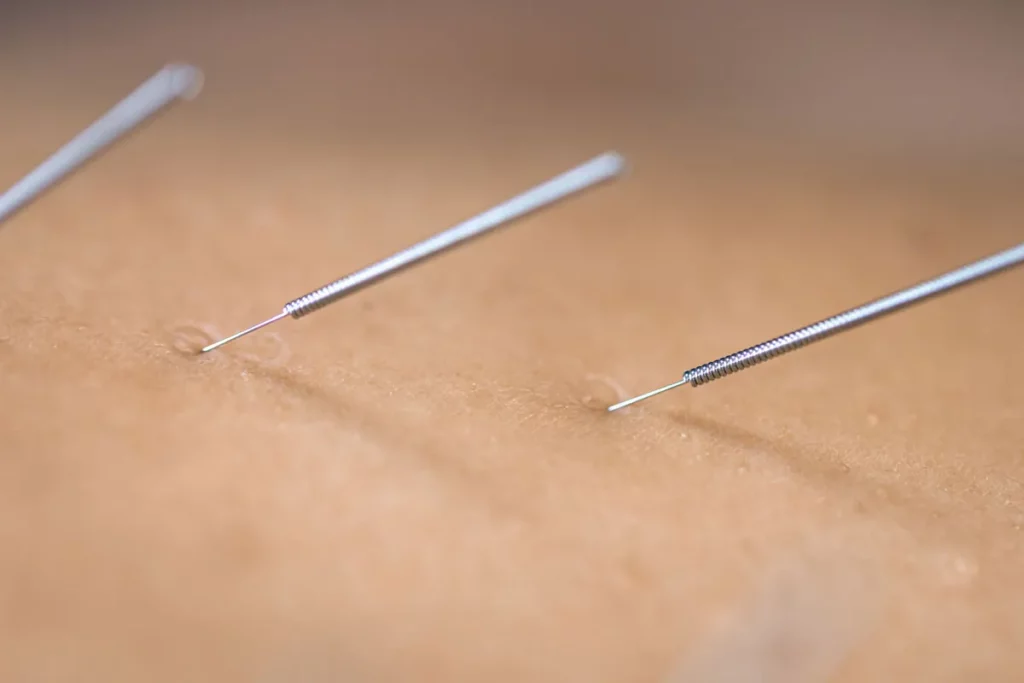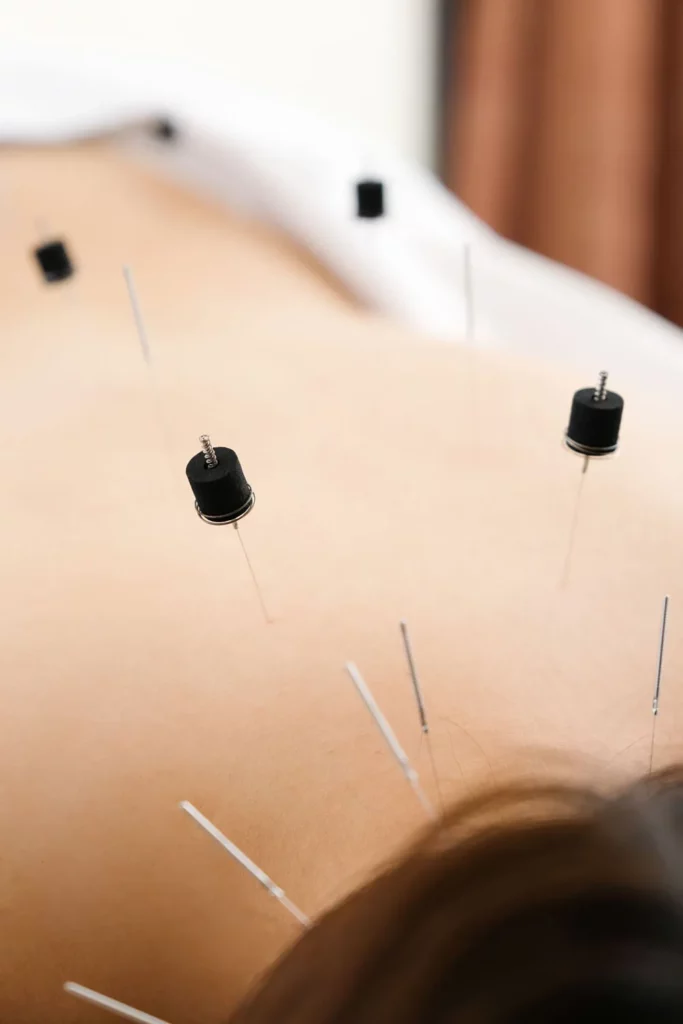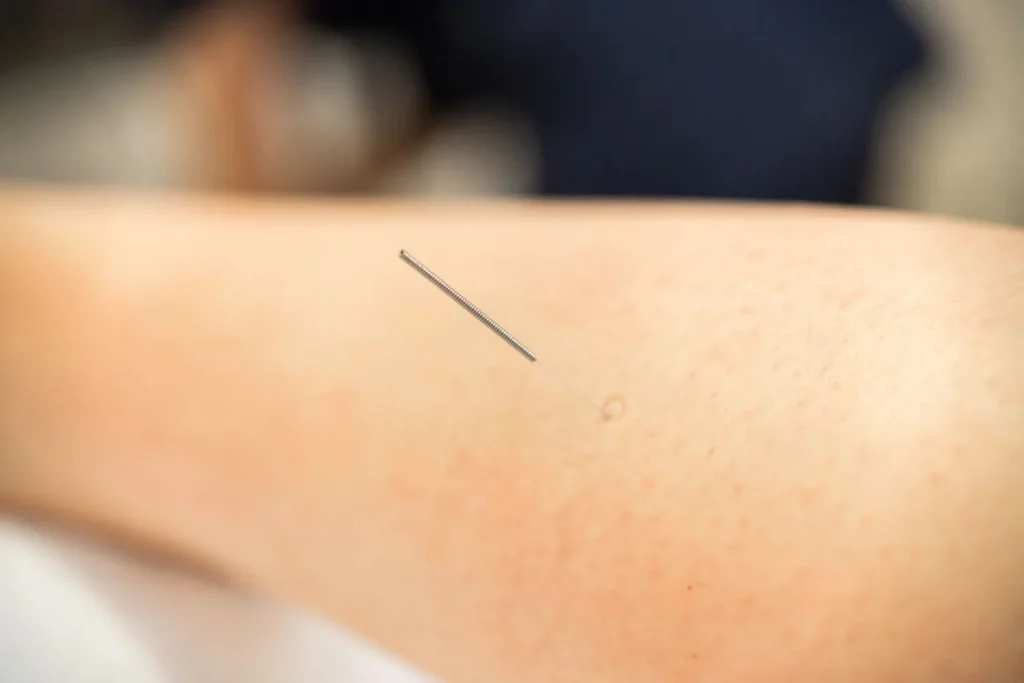
What is Dry Needling?
Dry needling is a specialised technique used by our Physiotherapists to help reduce pain, muscle spasm and inflammation, and to accelerate the recovery of injuries to muscles, tendons, fascia, and ligaments. Dry needling also helps improve blood circulation thereby accelerating the healing process. Dry needling is also known as myofascial trigger point dry needling.
What Conditions can Dry Needling Treat?
As part of an overall treatment strategy, combined with other physiotherapy techniques like manual therapy, dry needling can help a variety of conditions, for example:
- Acute or chronic soft tissue injuries
- Headaches
- Neck/Back pain
- Tendonitis/tendonosis
- Muscle spasm
- Joint pain
- Muscle strains
- Fibromyalgia
- Tennis or golfer’s elbow
- Patella Tendon Pain Syndrome (PTPS)
- Overuse injuries
- Iliotibial band syndrome (ITBS)


What is the Difference Between Dry Needling and Acupuncture?
The objectives and philosophy behind the use of modern dry needling by Physiotherapists is based on Western Neuroanatomy and the scientific study of the musculoskeletal and nervous systems. It is not based on traditional Chinese medicine.
With dry needling, needles are inserted into specific trigger points around the injured or painful area. Needles are left in for a very short period of time and are generally part of an overall treatment plan.
With acupuncture, needles are inserted into points along meridian lines. These lines represent the body’s organs, based on ancient Chinese medicine with the principal of restoring the proper flow of energy throughout the body. Acupuncture needles are usually left in place for 15 to 30 minutes. It is most often used to treat internal ailments, including digestive problems, insomnia, stress and chronic pain. Acupuncture is generally performed as a standalone treatment.
Your questions answered
Is Dry Needling Safe?
Understandably, some patients can be quite concerened about the use of needling but, in reality, it is generally quite safe. Our Physiotherapists have undergone specialist training, and along with their extensive understanding of the musculoskeletal system they are the ideal practitioners to perform dry needling. Minor side effects like mild soreness or bruising may be experienced by some patients.
Our Physiotherapists adhere to a strict code of conduct for the prevention of spread of infection and safely use and dispose of all needles.
Is Dry Needling Painful?
Most people do not feel the needles being inserted, but if the muscle fibres are sensitive or shortened due to injury or have hyperactive trigger points, you may feel a sensation similar to a muscle cramp called a “twitch response”.
However, it is important to let your practitioner know about your medical history, current condition, personal pain threshold, and past experiences with needles. This way, your Physiotherapist can evaluate the appropriateness of dry needling, specific to your case.
Can Dry Needling Replace Other Forms of Treatment?
Unlike acupuncture, dry needling is rarely used as a standalone treatment and is normally part of an overall treatment strategy. When you apply multiple treatment techniques you are more likely to gain a faster and more effective recovery.
Your Physiotherapist will discuss the most suitable treatment plan with you at the time of your appointment.
How Does Dry Needling Work?
Dry needling involves the insertion of incredibly thin needles into muscle trigger points which are focal points of spasm or “knots” within the muscle fibres. This in turn elicits a response that releases the active trigger point to restore normal function. Needles may also be inserted in or around tendons or ligaments to help promote healing, reduce inflammation and increase blood flow.
Do all Physiotherapists use Dry Needling?
Not all Physiotherapists use dry needling, but it is rapidly gaining popularity due to its effectiveness. Our Physiotherapists are required to complete a registered training course in dry needling, including a minimum of 20 hours of practice, prior to integrating dry needling into their treatment plan.
How often do I need Dry Needling?
The answer to this varies depending on your condition. Your Physiotherapist will advise you as to how many sessions you require which will depend on your injury or pain.
If you would like to make an appointment or speak to a Physiotherapist click to call us on 0131 218 3000 or email: info@thephysiotherapyclinics.com.
Find a location near you
The Physiotherapy Clinics - Gracemount
The Physiotherapy Clinics - Leith
The Physiotherapy Clinics - South Gyle
Peebles Physiotherapy
EXCELLENTTrustindex verifies that the original source of the review is Google. I can't thank Peter enough for guiding me through my shoulder rehabilitation program over the past few months. His instructions were very clear and the instructional videos made available through the app were really useful. I'd had niggling, low-level pain in my shoulder for around 13 years and then recently I lost full range of motion due to a karate injury; after working with Peter I can honestly say that my shoulder now feels better and stronger than it has done for a very long time! Thanks again :-)Trustindex verifies that the original source of the review is Google. Very grateful. Great serviceTrustindex verifies that the original source of the review is Google. I received fantastic, friendly help from Biju for a minor leg injury. The treatment and exercises he gave me completely sorted my issue. Would 100% recommend both him and the clinic!Trustindex verifies that the original source of the review is Google. Had a great experience at this clinic. Antony put together a detailed treatment plan for treating knee pain. He clearly explained how each exercise would benefit the activities I wanted to be able to do. Not only is he a great physio, but he is so friendly and always makes you feel listened to.Trustindex verifies that the original source of the review is Google. Phil has been supporting me a long standing complicated issue, which previous places have been unable to help. Phil's extensive experience and positive approach, coupled with his willingness to think outside the box is making a difference. Recently this approach has included the 3D movement scan. It's very easy to participate in, and it revealed problematic postural and movement detail that would be harder to discover by other means. I recommend the 3D scan as a rehabilitation tool.Trustindex verifies that the original source of the review is Google. I highly recommend the physiotherapy clinic South Gyle. I received a detailed assessment of my problem from Phil. He clearly explained the issues I'm having and why, plus the treatment, exercises required to rectify. Really happy with my experience and I would not hesitate to go back. Thanks PhilTrustindex verifies that the original source of the review is Google. I first attended the South Gyle clinic to see Anthony Guiducci on February 2023. I was suffering from a very painful trapped nerve in the lower back. Later in the year, with the back issue having been virtually cleared, I developed some nerve pain in the right knee along with general stiffness in the left knee. Finally around late October I had "tennis elbow" on my right elbow.I should say that I am 73 years old and spent many years playing contact sports, mainly rugby and football and now in my twilight years golf. It catches up with you eventually 😁. All through this time Anthony has been totally professional with a great knowledge of muscle and nerve structure and their interaction. His approach to giving you remedial exercises is well structured to your ability and takes great care that you keep within your capabilities as you build up the strengthening and more testing lessons. I can highly recommend him to anyone looking for physio help with their injuries or aches and pains. I must also say that, on the odd occasion when I had to use other physios at South Gyle, due to holiday leave I was equally impressed by the expertise of the staff.Trustindex verifies that the original source of the review is Google. Came here with a mild hamstring strain, ran a 3:30 marathon 5 weeks later! Anthony Guiducci = legendTrustindex verifies that the original source of the review is Google. Really thorough consultation. Excellent advice and follow-up arranged.